In today’s data-driven world, ETL (Extract, Transform, Load) tools play a crucial role in managing and processing large volumes of data efficiently. These tools help businesses extract data from various sources, transform it into a usable format, and load it into a destination system like a data warehouse. The right ETL tool ensures data accuracy, integration, and automation, enabling better decision-making. For XML-based sources, the Flexter XML Converter automates the transformation of complex XML into ready-to-use relational tables, making it easy to plug your XML data straight into any data warehouse.
Whether for business intelligence, analytics, or cloud data migration, choosing the best ETL tool is essential. With advanced features like real-time processing, scalability, and cloud compatibility, these tools streamline workflows and enhance data management for organizations of all sizes.
In this blog, we will take a look at the 10 Best ETL Tools.
What is ETL?
ETL (Extract, Transform, Load) is a data integration process that involves extracting data from various sources, transforming it into a structured format, and loading it into a target system, such as a database or data warehouse.
It is a fundamental component of data warehousing, business intelligence, and analytics, allowing organizations to consolidate and process data efficiently. MongoDB CDC (Change Data Capture) enables real-time extraction of changes from MongoDB, enhancing the responsiveness of ETL pipelines. This ensures that even rapidly changing datasets remain synchronized across systems for timely analysis. The Extract phase involves collecting raw data from multiple sources like databases, APIs, or files. The Transform phase cleans, enriches, and standardises the data through filtering, sorting, and applying business rules.
Finally, the Load phase transfers the processed data into a destination system for analysis and reporting. ETL helps businesses make data-driven decisions by ensuring high-quality, consistent, and structured data is readily available.
Types of ETL Tools
- Open-Source ETL Tools: Free and community-supported tools like Talend Open Studio and Apache NiFi, ideal for cost-effective data integration.
- Cloud-Based ETL Tools: Hosted on cloud platforms, such as AWS Glue, Azure Data Factory, and Matillion, providing scalability and flexibility.
- Enterprise ETL Tools: Robust and feature-rich tools like Informatica PowerCenter and Oracle Data Integrator, used for large-scale data processing.
- Real-Time ETL Tools: Designed for streaming data, such as Apache Kafka and StreamSets, enabling real-time analytics.
- Batch ETL Tools: Process large data volumes in scheduled batches, like SSIS and Pentaho.
- ELT Tools: Load data first and transform it inside the target system, such as Fivetran and Stitch.
List of 12 Best ETL Tools
1. Integrate.io
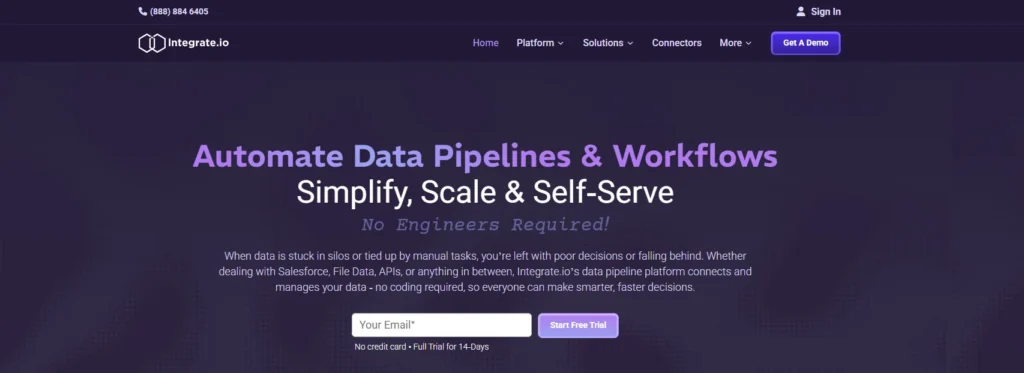
Businesses build automated data pipelines through Integrate.io, a low-code ETL and data integration platform. The platform integrates more than 100 SaaS applications and facilitates connections to databases and data warehouses simultaneously.
The platform facilitates secure efficient data processing through its API generation capabilities together with data transformations and field-level encryption features. A simple drag-and-drop interface enables users to construct complex workflows while maintaining clear control through an intuitive interface that doesn’t require advanced programming skills.
The cloud platform of Integrate.io provides scalable solutions that synchronise data in real-time while eliminating the need for businesses to build extensive infrastructure to achieve streamlined data integration and improved analytics.
Features:
- Low-code/no-code ETL development
- Over 100 pre-built data connectors
- API generation for seamless data access
- Field-level encryption for security
- Real-time data synchronization
- Cloud-based and highly scalable
- Built-in data transformation and cleansing tools
Cons:
- Limited customization for complex ETL workflows
- Pricing may be high for smaller businesses
Pricing:
- 14 days free trial
- Custom pricing
2. Hevo Data
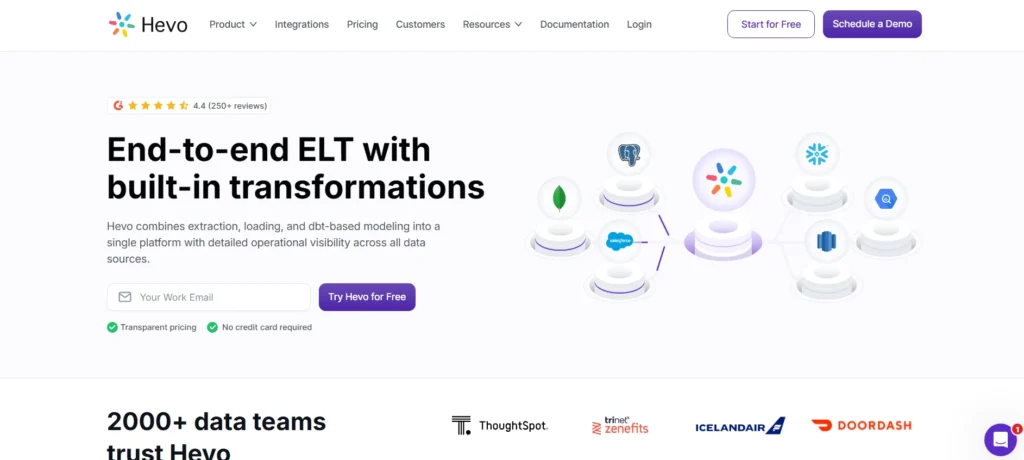
Hevo Data is a no-code data integration platform that enables businesses to effortlessly connect, transfer, and transform data across various sources and destinations in real-time. With over 150 pre-built, battle-tested connectors, Hevo allows users to set up and maintain data pipelines without writing a single line of code.
The platform supports both real-time data streaming and batch processing for large volumes of complex datasets, ensuring that data in target systems is always up-to-date for timely insights and decision-making. Hevo automatically handles schema drifts and intelligently recovers record failures with proactive alerts, requiring no manual intervention.
Features:
- Detailed operational visibility across all data sources
- 150+ pre-built connectors for databases, SaaS applications, and cloud platforms
- No-code pipeline setup with drag-and-drop interface
- Real-time data streaming and batch processing capabilities
- Python scripting and dbt integration for custom transformations
- Automatic schema evolution and error recovery
- Robust error handling and data validation mechanisms
3. Informatica PowerCenter
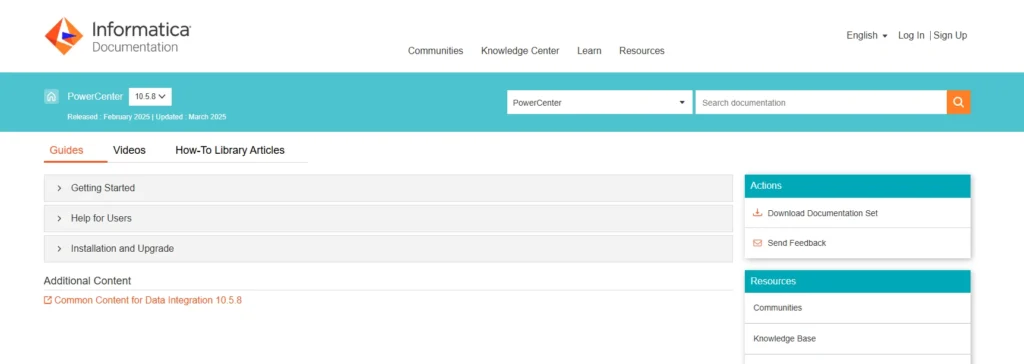
PowerCenter from Informatica delivers enterprise-level extraction-transform-load functionality alongside strong capabilities for both data integration and governance. The tool delivers strong automation capabilities alongside data quality features along metadata management tools to let businesses process large data sets effectively.
PowerCenter provides support for data acquisition from cloud platforms and on-site infrastructures together with hybrid combination solutions. The software comes with an automatic workflow creator which simplifies the development of intricate data handling processes.
Performance optimisation along with real-time monitoring and error handling capabilities make the tool an ideal choice for organizations requiring scalable high-performance ETL solutions to enable business intelligence data warehousing and advanced analytics initiatives.
Features:
- Enterprise-grade data integration and governance
- Metadata-driven architecture for data lineage tracking
- Scalable for handling large data volumes
- AI-powered automation for ETL workflows
- Advanced error handling and recovery features
- Cloud, on-premise, and hybrid deployment options
- Real-time monitoring and performance tuning
Cons:
- Requires significant expertise for implementation
- Higher licensing costs compared to open-source alternatives
Pricing:
- 30-day free trial
- Custom pricing based on enterprise needs
4. Coupler.io
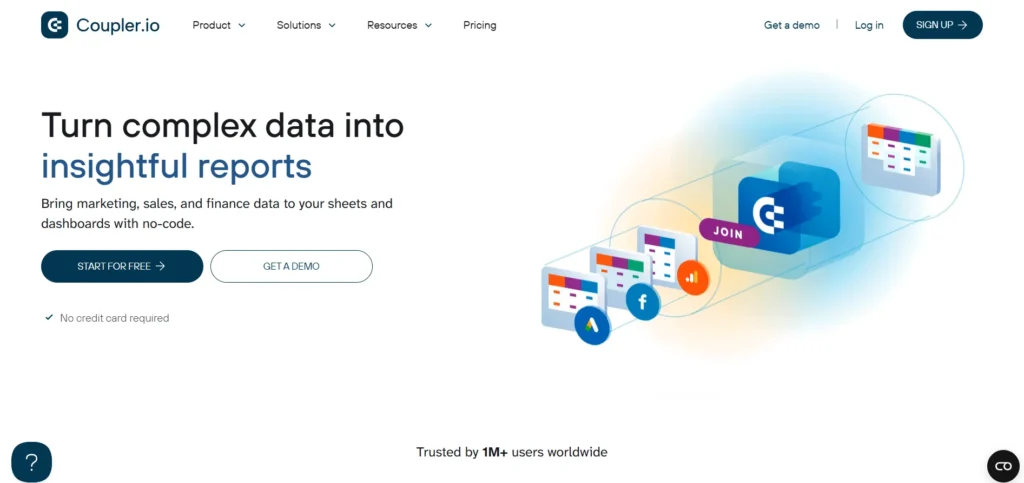
Coupler.io offers ETL with AI-powered functionality. This no-code platform collects, transforms, and analyzes data from 400+ sources like CRMs, ad platforms, and social media, delivering instant trends, benchmarks, and recommendations via AI Insights and natural language queries through Claude integrations.
Coupler.io offers ETL for marketing data that helps you with data cleansing and transformation, as well as automated reporting.
Also, the platform automatically syncs your data to dashboards, spreadsheets, data warehouses, BI tools, and more—so your numbers are always up to date.
Features:
- No-code data collection and automation
- Cross-channel marketing performance analysis
- Syncs data to dashboards, spreadsheets, and BI tools
- AI-generated insights and summaries
AI integrations
- Secure platform with SOC 2 certification
Cons:
- Starter plans limit data volume and refresh frequency
- Most dashboards export to external tools (in-app options are growing)
Pricing:
Try it for free. Paid plans start at 24$ per month.
5. Talend Open Studio

Talend Open Studio stands as one of the premier open-source ETL tools which delivers a flexible platform for data integration alongside its user-friendly interface.
Through its capability to work with various databases and cloud services as well as APIs, it enables smooth data extraction, transformation and loading procedures. Users who lack coding experience can utilise Talend’s graphical interface with drag-and-drop workflow designer capabilities.
Built-in components of this solution handle data quality operations alongside error processing while supporting process automation functions as well. The tool has gained popularity with businesses of all sizes who seek an affordable solution to scale their ETL capabilities for their data warehouse analytics and reporting needs.
Features:
- Open-source and free to use
- Drag-and-drop interface for easy ETL pipeline creation
- Supports a wide range of databases and cloud platforms
- Built-in data quality and cleansing tools
- Real-time error detection and debugging
- Supports batch and real-time processing
- Integration with big data technologies (Hadoop, Spark)
Cons:
- Lacks enterprise-level automation features
- Performance can be slow for very large datasets
Pricing:
- Starter – Contact sales
- Standard – Contact sales
- Premium – Contact sales
- Enterprise – Contact sales
6. AWS Glue

AWS Glue operates as a fully managed serverless ETL service to integrate data from multiple sources in a simplified manner. AWS Glue enables automated data discovery and cataloging alongside data transformation and loading operations for data lakes as well as warehouses including Amazon Redshift.
AWS Glue allows users to use its visual ETL interface for creating workflows through a process that does not require extensive coding operations. By leveraging Apache Spark for processing data AWS Glue delivers a cost-effective scalable and high-performance solution.
Businesses can develop end-to-end data pipelines and data analytics solutions within their cloud-native environment through the integrated capabilities of AWS services such as S3, RDS, and Athena.
Features:
- Fully managed, serverless ETL service
- Auto-generates ETL scripts in Python and Scala
- Tight integration with AWS services (S3, Redshift, Athena)
- Pay-as-you-go pricing model
- Machine learning-powered data cataloging
- Supports both batch and streaming data processing
- Built-in data deduplication and schema evolution
Cons:
- Steeper learning curve for non-AWS users
- Can become expensive with large-scale data operations
Pricing:
Custom pricing
7. Fivetran

Fivetran delivers ETL capabilities through its cloud platform which focuses on automated data integration tasks. Users gain access to 300 pre-made connectors to interface with databases, SaaS applications and cloud storage solutions.
Reliability and real-time synchronisation of data form the core focus of Fivetran, allowing users to keep their data consistent while maintaining low maintenance requirements. Fivetran operates without manual scripting since it automatically adjusts connected schemas and pipeline systems whenever there are modifications to source systems.
The fully managed hands-off approach of Fivetran is perfect for businesses that need to streamline their ETL workflows through its security compliance features alongside transformation automation capabilities and seamless integration with standard analytics tools.
Features:
- Automated schema evolution and pipeline maintenance
- 300+ pre-built data connectors
- No-code setup for data integration
- Near real-time data replication
- Secure and compliant (SOC 2, GDPR, HIPAA)
- Multi-cloud compatibility (AWS, GCP, Azure)
- Pre-built transformation templates for common use cases
Cons:
- Limited control over data transformations
- Higher pricing for high-volume data loads
Pricing:
- Free – $0
- Standard – $500/million MAR
- Enterprise – $667/million MAR
- Business Critical – $1,067/million MAR
8. Oracle Data Integrator (ODI)
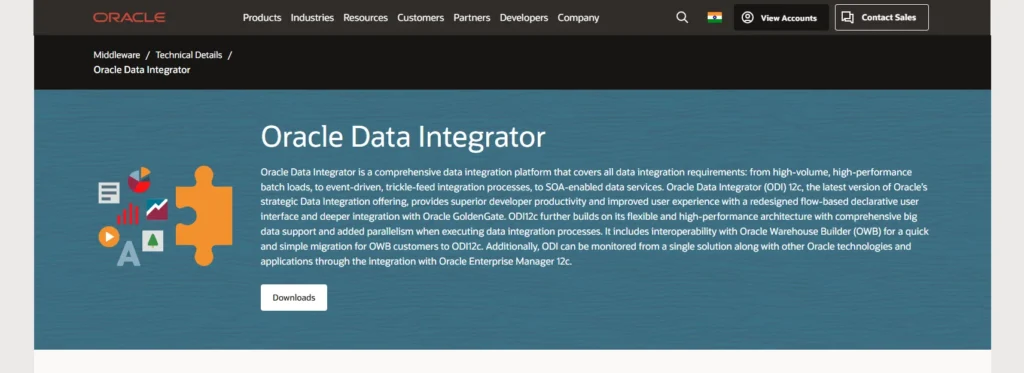
Oracle Data Integrator (ODI) is an advanced ETL and data integration platform optimized for high-performance data movement across heterogeneous systems. It supports batch processing, real-time data integration, and complex transformation logic.
ODI utilises an ELT (Extract, Load, Transform) approach, reducing data movement overhead and improving processing efficiency. It seamlessly integrates with Oracle’s ecosystem, including databases, cloud services, and enterprise applications.
With robust security, automation capabilities, and metadata-driven architecture, ODI is widely used by enterprises for data warehousing, big data processing, and cloud-based analytics, making it a powerful tool for large-scale data projects.
Features:
- High-performance ELT architecture (Extract, Load, Transform)
- Deep integration with Oracle databases and cloud services
- Batch and real-time data processing support
- Centralised metadata management
- Built-in security and access control features
- Advanced data validation and cleansing tools
- Hybrid and multi-cloud deployment options
Cons:
- Complex licensing structure
- Requires Oracle ecosystem for best performance
Pricing:
- Compute – Ampere A1 – OCPU varies by region and plan
- Compute – Ampere A1 – Memory $0.0194 per GB per hour (low memory), varies for high memory
- Compute – Standard – E4 – OCPU Varies by region and plan
- Compute – Standard – E4 – Memory $0.0194 per GB per hour (low memory), varies for high memory
- Compute – Standard – E3 – OCPU Varies by region and plan
- Oracle Cloud Infrastructure Kubernetes Engine – Enhanced Cluster Varies by region and plan
- Oracle Cloud Infrastructure Kubernetes Engine – Virtual Node Varies by region and plan
- Kubernetes Engine for Oracle Cloud Infrastructure: Basic Cluster
- Oracle Big Data Service – OCPU Per Hour Varies by region and plan
- Oracle Cloud SQL – Compute Capacity Varies by region and plan
9. Microsoft SQL Server Integration Services (SSIS)

SSIS is a comprehensive ETL tool included with Microsoft SQL Server that facilitates enterprise-level data integration and workflow automation.
It enables users to extract, transform, and load data from diverse sources into SQL Server databases, data warehouses, and cloud environments. SSIS provides a visual interface for designing complex ETL processes, along with built-in data cleansing, error handling, and performance optimization features.
Its tight integration with the Microsoft ecosystem makes it a preferred choice for businesses using Azure, Power BI, and SQL Server for analytics, business intelligence, and data management.
Features:
- Built-in SQL Server for seamless integration
- Visual workflow designer for ETL processes
- Advanced data transformation capabilities
- Real-time error handling and debugging tools
- Integration with Power BI for analytics
- Supports on-premise and cloud data warehouses
- Automatable scheduling with SQL Server Agent
Cons:
- Limited support for non-Microsoft data sources
- Requires SQL Server licensing for full functionality
Pricing:
Included with SQL Server; pricing varies based on edition
10. Apache NiFi
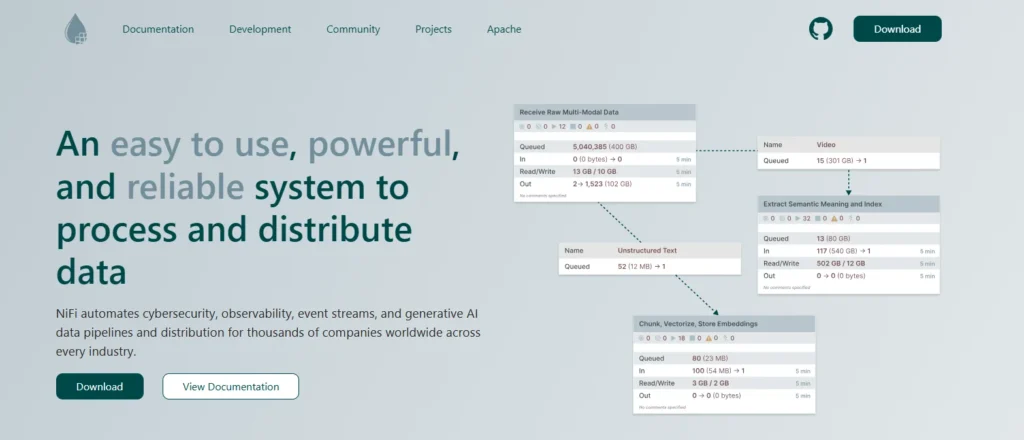
Apache NiFi is an open-source ETL tool designed for real-time data streaming and flow management. It provides a web-based interface for building complex data workflows using a drag-and-drop approach.
NiFi supports dynamic data routing, transformation, and system mediation across distributed environments. It integrates well with big data platforms like Apache Hadoop, Kafka, and Spark, making it ideal for large-scale data processing.
With built-in security, scalability, and extensibility, NiFi is widely used in industries such as finance, healthcare, and cybersecurity to process and monitor real-time data streams efficiently.
Features:
- Open-source and free to use
- Drag-and-drop interface for building data flows
- Supports real-time streaming data processing
- Fine-grained data routing and transformation control
- Scalable for large datasets and distributed environments
- Integration with big data platforms like Hadoop and Kafka
- Secure with role-based access and encryption
Cons:
- Steeper learning curve for beginners
- Can be resource-intensive for high-throughput workloads
Pricing:
Free (open-source), enterprise support available separately
11. Matillion
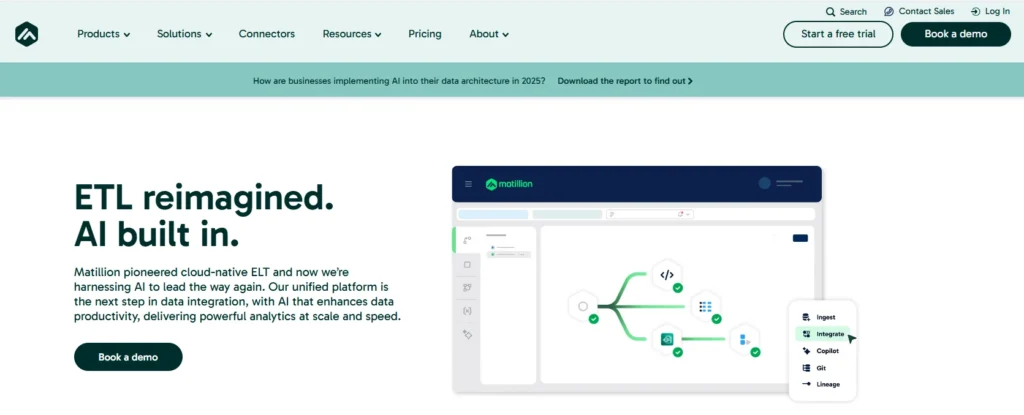
Matillion is a cloud-native ETL tool that enables data transformation for modern cloud data warehouses like Snowflake, Redshift, and BigQuery. It provides a visual workflow designer, allowing users to build complex data pipelines without extensive coding.
Matillion’s ELT (Extract, Load, Transform) approach enhances performance by leveraging cloud-based processing power. It offers extensive API connectivity, automation, and built-in transformation functions.
Designed for scalability, Matillion is well-suited for businesses looking to optimise cloud-based analytics, data engineering, and business intelligence workflows while minimizing infrastructure management overhead.
Features:
- Cloud-native ETL designed for Snowflake, Redshift, and BigQuery
- ELT (Extract, Load, Transform) approach for high performance
- Drag-and-drop UI with SQL-based transformations
- Built-in API connectivity for 100+ data sources
- Job orchestration and scheduling features
- Supports Python and Bash scripting for custom logic
- Scalable pricing based on data usage
Cons:
- Limited on-premise deployment options
- Can be costly for small businesses
Pricing:
- Developer – $0 monthly pre-paid credits
- Basic – $1,000 per month
- Advanced – $2,000 per month
- Enterprise – Contact sales
12. Azure Data Factory
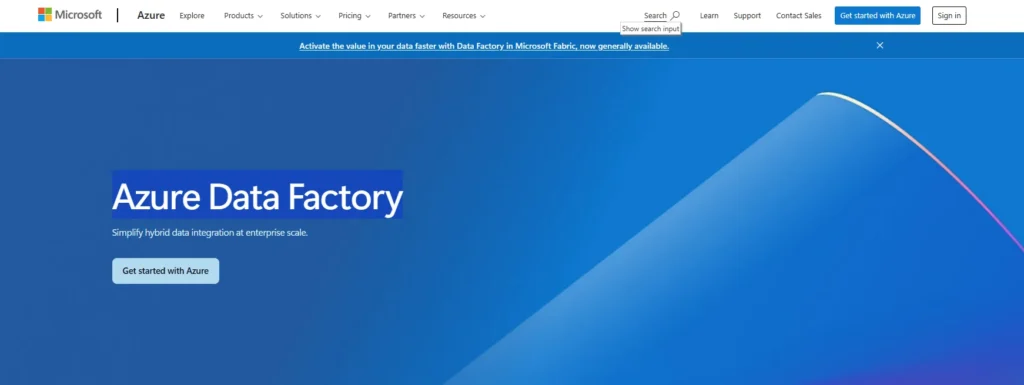
Azure Data Factory (ADF) is a cloud-based ETL and data integration service from Microsoft. It allows businesses to orchestrate and automate data movement across diverse sources, including databases, SaaS platforms, and big data systems.
ADF provides a visual designer for creating pipelines, supports code-based transformations, and integrates seamlessly with Azure Synapse, Power BI, and AI services. Its serverless architecture ensures scalability, and built-in monitoring helps track data flows efficiently.
Azure Data Factory is ideal for organisations leveraging Microsoft Azure for data warehousing, analytics, and machine learning applications.
Features:
- Fully managed, serverless data integration service
- No-code and code-based ETL pipeline options
- Deep integration with Microsoft services (Azure Synapse, Power BI)
- Supports both batch and real-time data processing
- Secure with built-in compliance features (ISO, GDPR)
- Pay-as-you-go pricing with auto-scaling
- Rich monitoring and logging capabilities
Cons:
- Complex pricing structure
- Best suited for Microsoft ecosystem users
Pricing:
Custom pricing
Ending Thoughts
ETL tools play a critical role in modern data management by enabling efficient data extraction, transformation, and loading across various systems. Businesses rely on these tools to ensure data accuracy, consistency, and readiness for analytics, reporting, and decision-making.
With the rise of big data, cloud computing, and real-time processing, ETL tools have evolved to support diverse architectures, including batch processing, real-time streaming, and ELT workflows.
Choosing the right ETL tool depends on factors like scalability, integration capabilities, cost, and ease of use. Whether open-source, enterprise-grade, or cloud-based, ETL tools help organisations streamline data workflows, improve business intelligence, and gain a competitive edge. As data continues to grow, ETL solutions will remain essential for efficient and reliable data management.
FAQs
Are cloud-based ETL tools better than on-premise ones?
Cloud-based ETL tools offer scalability, flexibility, and cost efficiency, while on-premise solutions provide greater control and security.
Can ETL tools handle real-time data processing?
Yes, modern ETL tools support real-time and batch processing for faster data integration and decision-making.
What industries use ETL tools?
ETL tools are used in finance, healthcare, e-commerce, marketing, telecom, and any industry dealing with large data sets.
Do ETL tools require coding skills?
Some ETL tools are no-code or low-code, while others require SQL, Python, or scripting knowledge for advanced transformations.



